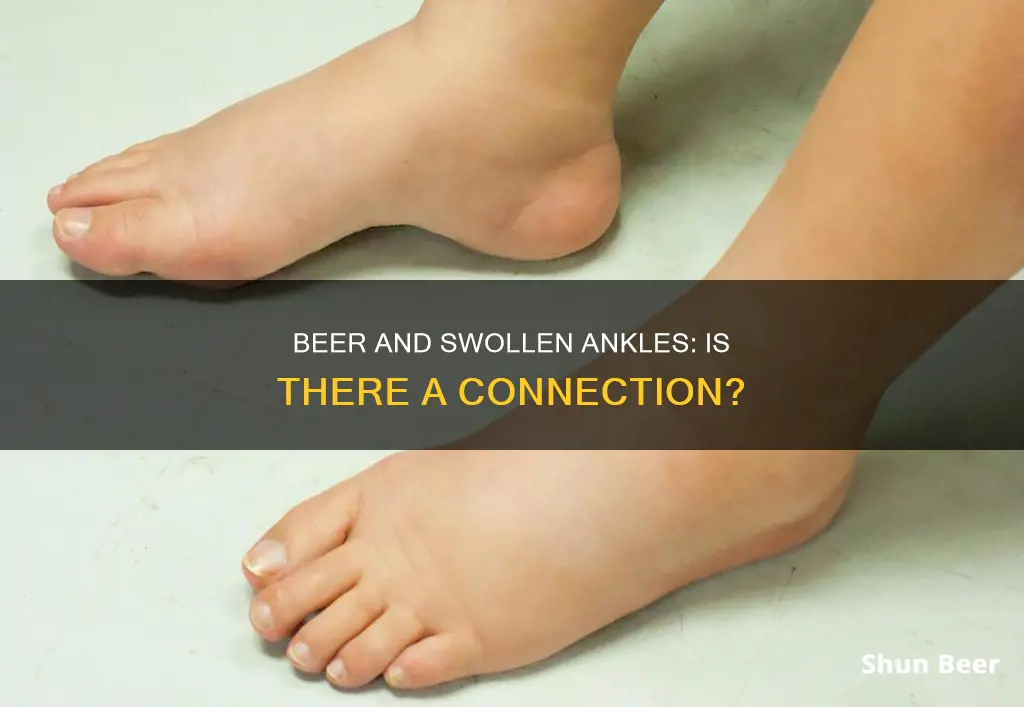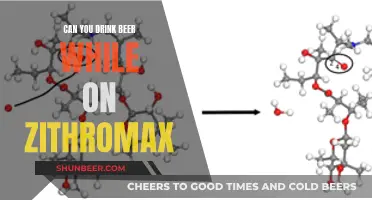
Drinking beer can indeed cause swollen ankles. Alcohol consumption can lead to water retention in the body, resulting in a condition called edema, which is characterised by swelling and puffiness in different parts of the body, most commonly the legs, ankles, and feet. Edema is caused by the dehydrating properties of alcohol, which block the release of the antidiuretic hormone (ADH) or vasopressin, leading to increased urination and subsequent dehydration. As the body tries to rebalance its fluid levels, it may start retaining too much water, resulting in edema and swollen ankles. While mild edema usually resolves within a day or two, persistent or frequent swelling could indicate more serious health issues, such as liver, heart, or kidney problems.
| Characteristics | Values |
|---|---|
| Reason | Excessive alcohol consumption causes water retention in the body |
| Medical Term | Edema |
| Cause | Dehydration |
| Dehydration Cause | Alcohol blocks the release of antidiuretic hormone (ADH) or vasopressin, which causes the kidneys to conserve fluids |
| Other Causes | Sitting for too long, high salt intake, certain medications, and some illnesses |
| Symptoms | Swelling in the feet, ankles, legs, hands, and face |
| Treatment | Elevating the feet, drinking water, limiting salt intake, and wearing compression socks |
| When to See a Doctor | If the swelling is persistent or severe, and/or accompanied by other symptoms like pain, skin changes, or chest discomfort |

Alcohol and water retention
Alcohol consumption can cause water retention in the body, which in turn leads to swelling in the feet and ankles. This condition is called edema and is characterised by excessive water retention, causing swelling and puffiness in different body parts. While edema is most common in the legs, ankles, and feet, it can also occur in the face, hands, and stomach.
Alcohol is a potent diuretic, encouraging the kidneys to produce more urine and leading to dehydration and swollen feet. Additionally, alcohol decreases the production of the hormone vasopressin, which normally signals the kidneys to reabsorb water. With less vasopressin, more water is lost through urination.
As the body gets dehydrated, it triggers a fluid shift, drawing water from the cells into the bloodstream to maintain blood pressure and vital organ function. This fluid shift is the main cause of edema, and the pooling of fluid in the feet and ankles due to gravity is known as peripheral edema.
While alcohol-induced edema is usually temporary and resolves within a day or two, frequent or persistent swelling could indicate a more serious health condition, such as heart problems, liver damage, or kidney disease. If edema occurs often and doesn't go away quickly, it is recommended to consult a doctor.
To reduce and avoid edema, it is advisable to drink alcohol in moderation, avoid excessive salty food, and drink water between alcoholic beverages to counteract dehydration. Elevating the legs and wearing compression socks can also help alleviate swelling.
Drinking Beer While On Duty: What's Allowed?
You may want to see also

Edema
Causes of Edema
Relieving Edema
Mild edema can often be relieved through simple measures such as elevating the legs above the heart while lying down, exercising the legs to improve blood flow, following a low-salt diet, and wearing support stockings. Additionally, it is important to avoid sitting or standing in the same position for prolonged periods.
When to Seek Medical Help
While edema is often a minor issue, it can sometimes indicate more serious health problems such as heart, liver, or kidney disease. If you experience frequent or persistent edema, especially if accompanied by other symptoms such as shortness of breath, fatigue, or rapid weight gain, it is important to consult a healthcare professional. They can help determine the underlying cause and provide appropriate treatment.
The Magic of Appearing Beer: Trick Explained
You may want to see also

Heart problems
Alcohol consumption can lead to swollen ankles and feet, which is usually a temporary issue that goes away within a couple of days. However, if the swelling persists, it could be a symptom of a more serious problem, such as heart issues.
Swelling in the lower parts of the body, such as the legs, ankles, and feet, can be a sign of congestive heart failure. This occurs when the heart struggles to pump blood effectively, causing blood flow to slow down and resulting in an increase in pressure within the veins. This increased pressure pushes fluid out into the surrounding tissues, leading to swelling.
If you experience swollen feet or ankles along with symptoms such as shortness of breath, fatigue, rapid weight gain, or a persistent cough, it is crucial to seek medical attention promptly. These may be signs of heart problems that require immediate attention.
Additionally, pulmonary edema, which is the accumulation of fluid in the lungs, can be caused by heart conditions such as congestive heart failure. This can lead to shortness of breath and difficulty breathing. While pulmonary edema itself might not directly cause swollen feet, its underlying cause, congestive heart failure, often does. Therefore, the presence of swollen feet alongside symptoms of pulmonary edema should trigger a consultation with a healthcare professional.
Beer and Colonoscopy: Drinking Timeline for the Procedure
You may want to see also

Liver damage
Alcohol-related liver disease (ARLD) is liver damage caused by excess alcohol intake. The liver is a resilient organ that can regenerate itself, but each time it filters alcohol, some of its cells die. Prolonged alcohol misuse over many years can reduce its ability to regenerate, leading to serious and permanent liver damage.
ARLD typically doesn't cause any symptoms until the liver has been severely damaged. When symptoms do appear, they may include:
- Jaundice (yellowing of the eyes or skin)
- Swelling in the ankles and abdomen (a condition called ascites)
- Confusion or drowsiness
- Vomiting blood or passing blood in stools
ARLD has three main stages, although they often overlap:
- Alcoholic fatty liver disease: This is the most common alcohol-induced liver problem and is characterised by a build-up of fat inside the liver cells, leading to an enlarged liver. It rarely causes any symptoms, but it's a warning sign that you're drinking at a harmful level. This stage is reversible if you stop drinking alcohol for an extended period.
- Alcoholic hepatitis: This is an acute inflammation of the liver that can be caused by long-term alcohol misuse or binge drinking. It may be the first time a person becomes aware of liver damage. Alcoholic hepatitis can be mild or severe. In mild cases, liver damage occurs slowly over many years, while severe cases can be life-threatening and sudden. This stage is also reversible if you permanently abstain from alcohol, but severe cases may require a liver transplant.
- Cirrhosis: This is the most advanced stage of ARLD, where the liver has become significantly scarred. Even at this stage, there may not be any obvious symptoms. Cirrhosis is generally not reversible, but stopping alcohol consumption immediately can prevent further damage and increase life expectancy.
If you suspect you may have ARLD, it's important to consult a healthcare professional. The treatment for ARLD primarily involves abstaining from alcohol, preferably for the rest of your life. This allows the liver the best chance to recover and prevents further damage. However, if a person is dependent on alcohol, stopping can be challenging, and medical treatment may be necessary. In severe cases, a liver transplant may be the only option.
Beer and Fluconazole: Is It Safe to Mix?
You may want to see also

Kidney disease
Drinking beer or any other type of alcohol can cause swollen ankles. This is because alcohol has diuretic properties, which encourage the kidneys to produce more urine, leading to dehydration. Alcohol also decreases the production of the antidiuretic hormone (ADH) or vasopressin, which is responsible for signalling the kidneys to reabsorb water. Without enough ADH, more water is lost through urine, and the body becomes dehydrated.
As the body gets dehydrated, it starts drawing water from the cells into the bloodstream to maintain blood pressure and keep vital organs functioning properly. This fluid shift is the main cause of edema, which is the collection of water in body tissues. Gravity causes the fluid to pool in the feet and ankles, leading to swelling known as peripheral edema.
While edema is often temporary and not serious, if it occurs frequently and does not go away quickly, it could indicate an underlying health issue. Swollen feet and ankles can be a symptom of kidney disease, which is one of the main functions of the kidneys to release excess fluid from the body. When the kidneys are not functioning properly, it can be difficult for them to release this excess fluid, resulting in swelling in the feet and ankles.
If you experience frequent or persistent edema, it is important to consult a doctor to rule out any serious health issues.
Enjoying Beer While Watching Champions League Games
You may want to see also
Frequently asked questions
Yes, drinking beer, or any alcoholic drink, can cause swollen ankles. This is due to the diuretic effect of alcohol, which causes dehydration and increased urination. The body then tries to retain water, leading to swelling or edema.
Edema is the medical term for swelling caused by excess fluid trapped in the body's tissues. It commonly occurs in the legs, ankles, and feet but can also affect other parts of the body.
Yes, edema can be caused by various factors, including sitting for too long, high salt intake, certain medications, and underlying health conditions such as heart, liver, or kidney disease.
Mild edema or fluid retention caused by alcohol usually resolves within 24 to 48 hours. If the swelling persists or is severe, it could indicate a more serious health issue.
If you experience swollen ankles after drinking beer or any alcoholic beverage, it is recommended to elevate your feet above the level of your heart to improve blood circulation. Reducing salt intake and drinking plenty of water can also help counteract the swelling.







